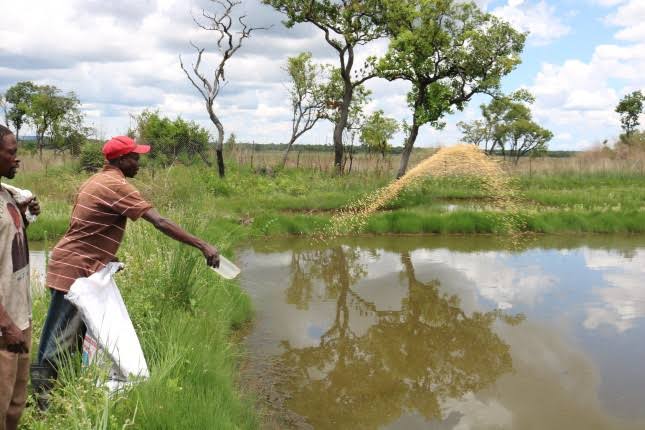Agriculture
Agricultural Mechanization: An Open Sesame To Food Security -By Abachi Ungbo
The conservative approach which has for far too long characterized our mode of operation is effectively incongruous in our modern world. And, it is the failure at mainstreaming technology into agriculture that has plunged the country to the primeval level.

The projection of a steep global population rise to about 9.7 billion by 2050 which Nigeria will be contributing about 400 million people should provide impetus in deploying the whole gamut of technology in practically scaling up agricultural productivity. Already, report has it, that food demand is expected to increase between 59-98 percent by 2050. This is strong enough reason to arm ourselves with the needed weapons in fighting shy of food shortages and its attendant consequences. The agricultural sector is indisputably the major employer of labour but has remained starved of key investments accounting for the abysmally low productivity which poses a major challenge to food security. Regrettably, the country has about 84 million hectares of arable land out of which only 33 million hectares is currently under cultivation.
This is the auspicious time to change the default picture of the Nigeria agriculture to something refreshingly different through the transition to a more efficient and effective practice that will see to the ramping up of agricultural productivity while saving time and energy. The conservative approach which has for far too long characterized our mode of operation is effectively incongruous in our modern world. And, it is the failure at mainstreaming technology into agriculture that has plunged the country to the primeval level.
Agricultural mechanization presents a vista of remarkable possibilities and opportunities to changing our agricultural narrative. Undoubtedly, it is a potent development instrument in light of the capacity to boost agricultural productivity with positive ramification on economic development and poverty alleviation. Instructively, the introduction of tractor into the agricultural firmament of America and the rest of the Western Europe became the game changer which ensured that by the 1950s, machinery had effectively replaced 24 million animals on American farms, improved farm productivity and changed land use patterns. As a result, tractor became the UNSUNG HERO of the twentieth century economic growth in the United States.
At the risk of sounding like a broken record, its about breaking ourselves loose from the subsistence farming to more commercially viable farming enterprise to attain increase crop production and expand land which will translate into increase income and livelihood to many. The entire U.S population is served by farmers and ranchers that make up less than 10% of the total population which is made possible through mechanisation.
The extent of the low level of agricultural mechanisation which has amply constricted the capacity to expand land for cultivation, timely farm operation and attaining economies of scale in food production can easily be gleaned from the sobering picture painted by the number of tractors per 100 square kilometre of arable land table. The country by country ranking puts Nigeria at the lowest rung of the ladder. From the table, Nigeria has a paltry 6 tractors as against the global standard of 127 tractors while African countries like South Africa and Kenya with 43 and 27 tractors respectively. And, countries like Thailand and Vietnam reputably known as net exporters of Rice having 281 and 262 tractors.
The President, African Development Bank(AfDB), Adeshina Akinwumi made an important point that “technologies to achieve Africas green revolution exist but are mostly just sitting on the shelves. The challenge is a lack of supportive policies to ensure that they are scaled up to reach millions of farmers. It must be said that apathy toward mechanisation is one out of the many explanations for the tardy progress toward enhanced productivity and by extension food security. So, what we have is the severe shortage of machineries across the entire food production system from the point of land preparation to harvest, post-harvest, storage making food security somewhat elusive.
I couldnt agree more that “Agricultural mechanisation could create new service and maintenance employment opportunity, if training centres are part of the mechanization process. These centres could also provide the transferable skills necessary for the economic diversification into industry that could provide jobs for the large youth population that will soon reach employment. So, it was an exciting piece of news that the government secured a loan facility for an ambitious mechanization drive which the Minister of agriculture was quoted as saying that the endeavour is a “major revolution in the agricultural sector that we have never seen before, which is aimed at establishing 632 tractor serving centres across the country. Well, i take serious exception to the source of funding which is explicable in light of the already mounting debt which is proving to be an albatross around the country’s neck. At any rate, it is a brilliant idea and i remain total enamoured by the private ownership component which will be done through a competitive bidding and the huge employment prospect. Aside direct intervention government need to focus on developing machineries and implements through the utilization of the capacity that abundantly exist in our tertiary institutions’ engineering department as well as collaboration with indigenous fabricators to tailor our needs based on our peculiar environment. Also, incentives and environments for local tractor assembling plant needs to be established.
Agricultural mechanisation is supported through various government programmes like subsidizing cost of tractors to farmers or private hiring service provider. Nonetheless, a clear and free- standing agricultural mechanisation policy needs to be developed. We have never had shortages of ideas or policies and even resources but we have always been short on political will to follow them through. A broad suite of policies will be needed to accompany the mechanisation drive. The country will be placed on the path of becoming a bread basket should the current enthusiasm toward mechanization be allowed to endure.
ABACHI UNGBO
abachi007@yahoo.com

















